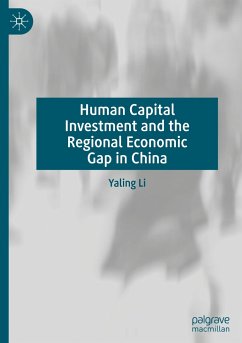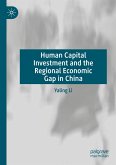According to the neoclassical growth theory and the endogenous growth theory, changes in the stock of capital and labor affect economic growth rates in the short run, and differences in human capital stocks are likely to affect total factor productivity directly and long-term economic growth rates indirectly. Therefore, human capital is a factor in the secular trends of regional economic gaps. In this study, the author examines the relationship between regional economic disparities and the country's human capital stocks and structure in China between 1990 and 2015, a period of economic transformation in the country. Available empirical evidence supports the argument that boosting investment toward and optimizing the spatial distribution of human capital can help mitigate regional economic disparity and facilitate balanced and coordinated economic development across the country.
Bitte wählen Sie Ihr Anliegen aus.
Rechnungen
Retourenschein anfordern
Bestellstatus
Storno








